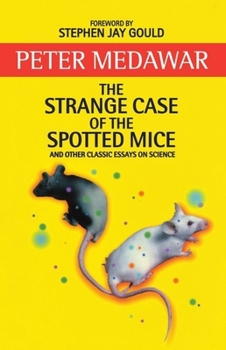The Strange Case of the Spotted Mice: And Other Classic Essays on Science
Sir Peter Medawar was not only a Nobel prize-winning immunologist but also a wonderful writer about science and scientists. Described by the Washington Post as a "genuinely brilliant popularizer" of science, his essays are remarkable for their clarity and wit. This entertaining selection presents the very best of his writing with a new Foreword by Stephen Jay Gould, one of his greatest admirers.
The wide range of subjects include Howard Florey and penicillin, J. B.S. Haldane, whom he describes as a "with-knobs-on variant of us all," and, in the title essay, scientific fraud involving laboratory mice. There is Medawar's defence of James Watson against the storm of criticism that greeted the publication of The Double Helix. A merciless debunker of myths, he reveals the nonsense to be discovered in psychoanalytic interpretations of Darwin's illness and launches devastating attacks on Arthur Koestler, IQ psychologists, and, most notably, Teilhard de Chardin. He raises questions about the nature of scientific endeavour--he famously defined science as the art of the soluble--and a common theme is his desire to communicate the importance of science to the widest possible audience.
The wide range of subjects include Howard Florey and penicillin, J. B.S. Haldane, whom he describes as a "with-knobs-on variant of us all," and, in the title essay, scientific fraud involving laboratory mice. There is Medawar's defence of James Watson against the storm of criticism that greeted the publication of The Double Helix. A merciless debunker of myths, he reveals the nonsense to be discovered in psychoanalytic interpretations of Darwin's illness and launches devastating attacks on Arthur Koestler, IQ psychologists, and, most notably, Teilhard de Chardin. He raises questions about the nature of scientific endeavour--he famously defined science as the art of the soluble--and a common theme is his desire to communicate the importance of science to the widest possible audience.
Format:Paperback
Language:English
ISBN:019286193X
ISBN13:9780192861931
Release Date:June 1996
Publisher:Oxford University Press
Length:256 Pages
Weight:0.48 lbs.
Dimensions:0.7" x 5.1" x 7.7"
Related Subjects
History & Philosophy Science Science & Math Science & Scientists Science & TechnologyCustomer Reviews
1 rating
Stroke of genius and other ironies
Published by Thriftbooks.com User , 18 years ago
In his introduction (written in 1996), Stephen Jay Gould calls Peter Medawar "our century's greatest spokesman for the power and humanity of science." Certainly, he should rank near the top, but Medawar has never been as popular as some others. It may be that his fearsomely sharp tongue frightens people. We think, If Medawar can be so scathing about (insert famous name), what might he say about us? Well, we're safe now. He died in 1987. Or perhaps he is not romantic enough for us. As an example of the first: "Disputants so naïve should abstain from public controversy." Of the second: "There is poetry in science but also a lot of bookkeeping." This collection includes some of Medawar's most famous essays and debunkings, including his evisceration of psychoanalysis; "Is the Scientific Paper a Fraud?"; and his review of Teilhard's "Phenomenon of Man," which exposed a lot of prominent and self-important people -- many of them editors of powerful publications -- to be fools. Little wonder people were careful around Medawar. However, he had a mild side. To me, "The question of the existence of God" is the least satisfactory. Medawar did not believe in a god, but he was (uncharacteristically, some might think) inclined to be somewhat wistful about those who did. One would have expected him to have brought them to book for their crimes. Another reason Medawar's collections of essays may not have worn so well is that many were written for an occasion (often as a book review), which led him to restate his firm positions, such as that there is no such thing as a "scientific method." True, and it very much bears repeating to each new generation. But it does not bear repeating in the same volume so well. It is too bad Medawar (a very busy man who won a Nobel for his research and was a director of important laboratories besides) never wrote a magnum opus. The collection of essays in "Pluto's Republic" is probably his most popular and solid. The essays in "The Strange Case of the Spotted Mice" do not hang together so well, although anyone who got to know Medawar through "Republic" will want to meet the man in person in "Son of Stroke" and "On living a bit longer," products of his long period of physical debility. Medawar was among the first to expose the vapidity of Lacan and Foucault -- though in brief fashion -- and this is so surprising coming from an active scientist, who one would have thought had little time to be plowing through turgid tomes of dubious French "scholarship." But he was always interested in what C.P. Snow called "the two cultures," and he was not shy about lampooning the fatuities of overeducated scientific illiterates: "If a scientist were to cut his ear off, no one would take it as evidence of a heightened sensibility." He died before the global warming hoax took hold, but he identified one of its vectors when he wrote "reporters want clear stories without the cagey reservations scientists are always introducing." Well, the






